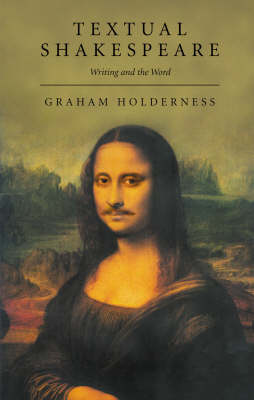"Textual Shakespeare" reassesses the Bard as a writer in the light of the late-20th century "revolution" in bibliography and textual studies. Reviewing debates in textual theory and practice, Holderness concludes that "Shakespeare" is not a writer but a collection of documents, none of which can with any certainty be linked to whatever it was the author wanted to say. According to modern literary studies all texts are copies, always already changed, and there are no "originals". Editors are translators; and scholars and critics rewrite the writing they study. Holderness goes beyond both traditional and "materialist" bibliography to show that texts are both physical media, made and remade by a series of craftspeople; and rich repositories of changeable meaning. The book advocates a recovery of ancient concepts such as creativity and imagination, together with a recognition of the technical and essentially collaborative nature of all writing. Shakespeare is then situated within this theoretical context, via a brief history of the plays' textual reproduction.
Here Holderness shows that modern Shakespeare editions are radical rewritings, and that contemporary textual theory opens the way to much more inventive textual activities of reconstruction and translation. A series of chapters on individual plays provides illustrative examples of such textual activities in practice. The two texts of "King Lear" are studied as discrepant reworking of a traditional narrative. The single text of Macbeth is compared to a text-that-never-was - the version seen by an eyewitness in 1611 - and the lost text reconstructed from that evidence. A chapter of Hamlet concentrates on 20th century rewritings of the plays, including Holderness' own novel "The Prince of Denmark" (2001). The two texts of "Henry V" are examined as evidence of a substantial gap between theatrical writing and theatrical practice in the theatre of Shakespeare's day. The book concludes that all Shakespeare scholarship, editing and criticism are devoted to a quest for something missing: not the lost manuscript (which even if recovered would not in any case answer all our questions), but rather the absence that writing always invokes.
Where this insight takes us is the subject of a tantalising and suggestive conclusion. Holderness stresses throughout the creativity involved not only in the act of writing but in the many processes of rewriting that make up any historical culture. By way of illustration "Textual Shakespeare" includes a number of short "creative" works, mostly verse translations of Latin and Old English poems. The book thus attempts to build bridges between writing and criticism, creation and reproduction, "text" and "technology". Drawing on an wide range of sources, from classical poetry to deconstructionist theory, from Anglo-Saxon verse to modern bibliographical scholarship, this is a critical-creative book for the 21st century.
- ISBN10 1902806212
- ISBN13 9781902806211
- Publish Date 26 September 2003
- Publish Status Out of Print
- Out of Print 24 April 2015
- Publish Country GB
- Imprint University of Hertfordshire Press
- Format Paperback
- Pages 304
- Language English
